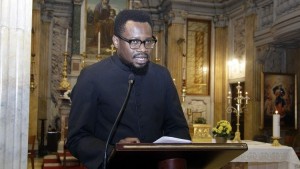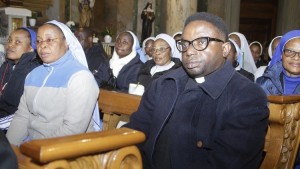Moved by the endless challenges in their country, the Association of Nigerian priests, religious and seminarians in Rome (NIPRELS) on Saturday afternoon came together to pray for their country.
The afternoon was divided into two parts. The first was the rosary procession which began at 14.00hrs from the Church of Santa Maria in Traspontina, located in via Della Conciliazione, of the Vatican’s Borgo district.
The blood of martyrs
 President of NIPRELS, Fr Basil Chinedu Achusim, a doctoral student-priest from Nigeria’s Onitsha Archdiocese, was keen to underline that the gathering of Nigerians in Rome is understood in context.
President of NIPRELS, Fr Basil Chinedu Achusim, a doctoral student-priest from Nigeria’s Onitsha Archdiocese, was keen to underline that the gathering of Nigerians in Rome is understood in context.
This “is not an act of protest or anything political. Not at all. It is just a people of God at the feet of the Lord on this sanctified ground of Saint Peter’s Basilica, smeared by the blood of martyrs and Apostles to pray to God to intervene in the life of our nation, Nigeria,” he said and added, “We want God to readily and rightly intervene to bring about change and radical transformation for good,” Fr Achusim explained.
Adoration in Sant’Anna dei Parafrenieri
Nigerian Cardinal Francis Arinze, who recently turned 90 years old, participated in the Saturday events. Nigerian Catholic faithful visiting and residents of Rome joined the priests and religious in the procession. Also present were representatives of the Nigerian embassy to the Holy See. They all recited the rosary and prayed in Saint Peter Square.
After the rosary in Saint Peter Square, the Nigerians proceeded to the Church of Sant’Anna di’ Parafrenieri in the Vatican for the second part of their programme -a period of Eucharistic Adoration. Located just beyond Porta Sant’Anna, one of the main gates to the Vatican City, the church, also known in English as Saint Anne of the Grooms, is perhaps the only place of prayer within Vatican walls open to the public.
Uncertainty and apprehension
 According to the magazine, Foreign Affairs, Nigeria -Africa’s most populous country, is experiencing a dramatic upsurge in everyday violence, including abductions, religiously motivated attacks, assaults by armed gangs, terrorism and police brutality. Authorities are failing to contain the chaos, risking the future of Africa’s powerhouse.
According to the magazine, Foreign Affairs, Nigeria -Africa’s most populous country, is experiencing a dramatic upsurge in everyday violence, including abductions, religiously motivated attacks, assaults by armed gangs, terrorism and police brutality. Authorities are failing to contain the chaos, risking the future of Africa’s powerhouse.
It is not far-fetched to say Nigerian people, as a whole, feel they are living a martyrdom of sorts. A religious sister who works in Italy and participated in the Saturday procession and adoration spoke about experiencing an oppressive climate of fear for personal safety back in her hometown of Nigeria. She did not want to be named because she did not have permission from her superiors to speak to the media. She told Vatican News of going to Nigeria for holidays only to be confined to the house and courtyard of her parents. “I could not freely go out for Mass or to visit other communities of our sisters as I have often done in the past. There was always this fear of being kidnapped. What kind of a holiday is that?” she wondered.
The challenges
The abduction of a priest or a religious sister makes news. By Vatican News’ assessment, more than 20 priests have been kidnapped this year alone. Yet truth to tell, ordinary Nigerians and villagers in remote areas bear the worst of the violence and insecurity.
Apart from insecurity, numerous other challenges exist, such as natural disasters beyond authorities’ control. The Nigeria Situation Report of November 2022 reads like an endless list of woe and doom. These are stories that do not make headlines.
This year alone, the number of people affected by widespread flooding across Nigeria is over 3.2 million, with over 600 deaths; As a result, over 1.4 million people have been displaced. 14,000 people have been affected by cholera in Borno, Adamawa and Yobe States since January, with 443 deaths; 4.1 million people face severe food insecurity this lean season and 1.74 million children under 5 were projected to suffer from acute malnutrition this year.
Fr Achusim said Nigerians are tired especially of self-inflicted suffering, of “bad governance, corruption and bad politicking.” Though far from home, the Nigerian community in Rome decided on a rosary procession and adoration to cry to God for help and intervention.





